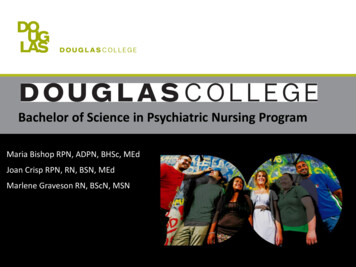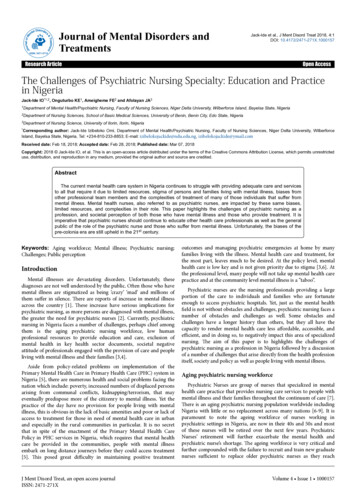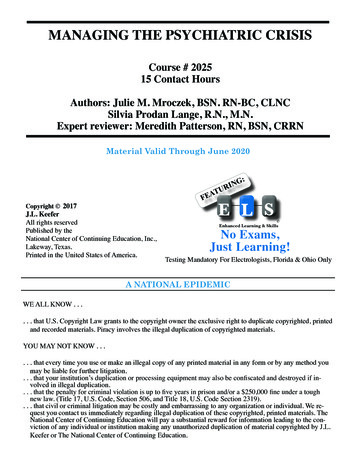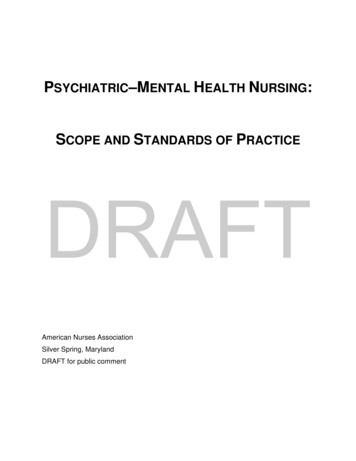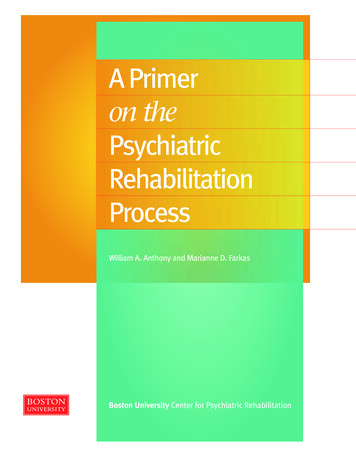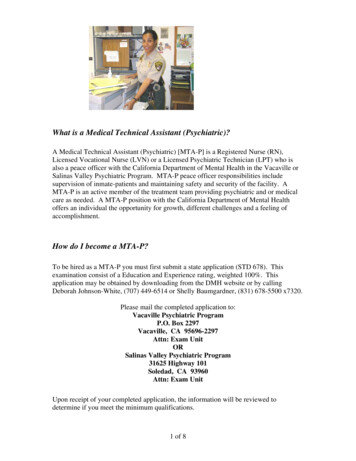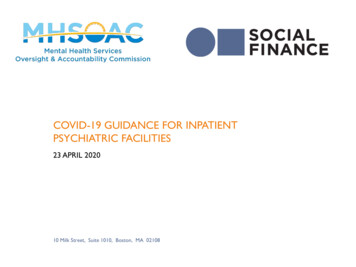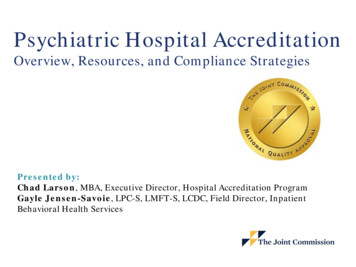
Transcription
SERVICEDESCRIPTION2022NEW HOPE CAROLINASPsychiatric ResidentialTreatment FacilityACCREDITED BY
Table of ContentsSectionPageMissionPhilosophy of CareBuilding Bridges Initiative and Six Core Strategies Pledge1122Referral and Admission Information2Introduction4I. Residential ServicesTherapeutic CommunitiesWaypoint for Young Men with Emotional and Behavioral ChallengesNew Choices for Young Men with Intellectual Disabilities, Emotional,and Behavioral ChallengesStarting Pointe for Young Men with Problem Sexual BehaviorTransformations for Young Women with Emotional and Behavioral ChallengesSafe Harbor for Young Women with Intellectual Disabilities, Emotional,And Behavioral ChallengesLEAP for Young Men on the Autism Spectrum567II. Clinical ServicesEmpirical FoundationEmpirically-Informed and Evidence-Based ApproachesTreatment ProcessTreatment ModalitiesProblem Sexual Behavior in Youth91011131416III. Education Services16IV. Medical ServicesV. After Hours/Emergencies1818References1878899
New Hope CarolinasPlan for Services – 2018-19New Hope Our Name, Our PromiseMissionOur central mission is guiding the healing process of children, adolescents, and their families who areburdened by psychological and psychiatric illnesses. We seek those who suffer more than minormaladjustment and whose needs are such that others have been unable to help. At New Hope, care andunderstanding are informed by knowledge to provide services designed to restore healthy functioning.We promise to: Recognize that care delayed is care denied. We will always respond to a child’s needs, and those ofeach child’s family and caseworker, promptly and appropriately. Provide a safe, secure, healthy, and nurturing learning environment for every child. Respect the rights, needs, expectations, and individual differences of each child, including the needfor safe and stable adult relationships. Promote an atmosphere of continuous personal and professional growth.Philosophy of CareNew Hope maintains a philosophy of care that has evolved over the many years we have served troubledyouth and their families. Our philosophy flows directly from our mission and promise statements.Our values include: Treating everyone with dignity and respect Creating a therapeutic relationship that puts the needs of the youth first and honors the youth’s inputinto their care and treatment Providing individualized treatment and education for each youth in a safe and stable setting Actively engaging families in therapy, education and program activities Using evidenced-based models whenever possible Promoting responsibility, autonomy, and competency development through education,multidisciplinary collaboration and support Implementing a humanistic, holistic, and trauma-informed approach to treatment Healing pain in ways that foster health and wellbeing Providing effective, equitable, understandable and respectful quality care and services that areresponsive to diverse cultural health beliefs and practices, preferred languages, health literacy andother communication needsBuilding Bridges InitiativeJoint Commission and Cognia AccreditedPage 1 of 20
New Hope CarolinasPlan for Services – 2018-19Building Bridges 4 Youth is a joint resolution initiated by the Substance Abuse and Mental HealthServices Administration (SAMHSA) “to advance a statement of shared core principles” that promotecollaboration between residential and community-based providers, families, and youth. These coreprinciples include 35 empirically based values that guide all service delivery. New Hope fully supportsthe Building Bridges Joint Resolution. Details are available at www.BuildingBridges4Youth.org.Six Core Strategies PledgeThe Six Core Strategies (6CS) is an evidenced –based practice designed to achieve the cultural changethat is required to successfully prevent and reduce the use of restraint and seclusion. The Six CoreStrategies utilizes strength-based/recovery oriented, trauma-informed care and consumer/client andfamily driven foundation principles for operationalizing practices that result in significantly reducingthe use of restraint and seclusion. The 6CS are based on these core beliefs; Leadership Principles drive effective change Utilizing a Public Health Prevention approach (anticipating risks, intervening early and usingcorrective actions to mitigate future occurrences) Embracing Recovery and Resiliency principles Value consumer and staff self-reports of what works Operationalizing knowledge of trauma and its effects on our clients Staying true to Continuous Quality Improvement principlesNew Hope Treatment Centers Inc. fully supports and endorses these core beliefs through; Leadershipthat endorses changing the culture as needed to reduce/eliminate restraint and or seclusion (R/S), usingdata to inform our practice as we examine strategies to avoid R/S, developing our workforce toimprove their ability to prevent and manage acuity and to better understand the risks and benefits ofeliminating R/S, using prevention strategies to help consumers and staff better understand and utilizecoping strategies when in distress, through the full inclusion of youth and family choices and byrigorously de-briefing every critical event in an efforts to understand the underlying causes andcontributors in order to work towards an improved outcome and prevention of similar future event.Referral and Admission InformationTo make a referral,Please contact New Hope Treatment Centers’ National Referral System (NRS) at:1-800-776-6482Admissions are scheduled Monday through Friday between 8 a.m. and 4 p.m.New Hope does not require a formal standardized application. We ask referents to organize all relevantavailable information into a packet and send it to our National Referral System where it is forwarded forreview by our facility clinical team. When additional information is needed we contact the referralsource.Joint Commission and Cognia AccreditedPage 2 of 20
New Hope CarolinasPlan for Services – 2018-19Our multidisciplinary team of specialists closely reviews all pertinent information to determine ourability to safely and effectively serve each youth and his or her family. In rare cases when we cannotadmit a youth, we attempt to provide recommendations for alternate placement options that may providea better fit for the youth’s needs.Services must:1. Be recommended by a physician or other licensed mental health practitioner; and2. Meet the basic medical necessity criteria for psychiatric residential treatment services through atleast one of the following criteria: The child is at immediate risk of harm to self or others and in need of psychiatric hospitalization; Is psychologically unstable and at high risk of developing more severe or persistent symptoms; Has been removed from his or her home due to psychological instability; or Is mentally ill or emotionally disturbed as documented by a DSM-V diagnosis and needsspecialized residential treatment services.While we offer a broad range of programs and services designed to meet the needs of most young peoplereferred for services, there are some limitations in what we can provide. We do not accept youth who are actively suicidal or homicidal. Adolescents with severe or chronic medical conditions are carefully screened for goodness of fit.Some medical conditions require a specialized care environment that New Hope is unable toprovide. Generally, we do not accept adolescents who are actively psychotic, diagnosed withDown’s syndrome, Schizophrenia, or eating disorders. Adolescents being referred should not require extensive physical restraint or other specialprocedures for assaultive, self-injurious, or destructive behavior. We are equipped to handlephysical aggression but we are not a correctional facility and cannot serve extremely aggressiveyouths who chronically disrupt a treatment setting. We offer programs designed to treat youth with Intellectual and/or Developmental Disabilities,(IDD). New Choices is designed for males and Safe Harbor is designed for females. Theseprograms will consider youth who are IDD or who are of borderline intellectual functioning, aslong as the adaptive deficits are suitable for the daily routine and other requirements of the program. We do not discriminate against anyone based on age, race, religion, sexual orientation, disability,or economic status.Joint Commission and Cognia AccreditedPage 3 of 20
New Hope CarolinasPlan for Services – 2018-19IntroductionNew Hope Carolinas is a Psychiatric Residential Treatment Facility (PRTF), providing comprehensiveresidential services for youth between the ages of 12 and 21. Our campus is conveniently located in RockHill, South Carolina, 20 minutes south of Charlotte, North Carolina and Douglas International Airport.We are less than an hour north of Columbia, South Carolina and are easily accessible to interstate I-77.New Hope Carolinas is a subsidiary of New Hope Treatment Centers, Inc., a nationally recognizedbehavioral healthcare provider founded in 1987. We offer a comprehensive array of services thatincludes clinical evaluations, assessment, crisis stabilization and psychiatric residential treatment, Weare proud to partner with child serving agencies around the country in order to best serve youth andfamilies.Our residential programs are licensed by the South Carolina Department of Health and EnvironmentalControl (DHEC) to serve 150 young people and have been fully accredited by The Joint Commissionsince 1998. Our educational services are fully accredited by Cognia Inc., an internationally recognizedleader in educational accreditation.Eight distinct therapeutic communities offer specialized services for young men and women who presentwith a variety of challenges, including mood disorders, substance abuse, behavioral disorders, autismspectrum disorder and problem sexual behavior. These programs serve adolescents with normalcognitive functioning and those with intellectual and developmental disabilities. Staff is specially trainedto provide a trauma-informed approach for young people and their families.All services adhere to practice parameters established by the American Academy of Child andAdolescent Psychiatry, (AACAP). Programs addressing problem sexual behavior reflect currentempirical evidence and information provided through the Association for the Treatment of SexualAbusers (ATSA).We offer an empirically based approach to care with on-site medical and psychiatric services, a yearround, fully accredited school, and indoor and outdoor recreation therapy provided by more than 400caring professional staff. Board certified psychiatrists work closely with licensed mental healthclinicians to provide comprehensive clinical services as part of a holistic approach that includes a varietyof evidence-based practices. Interventions are tailored to meet individual needs and are based on eachchild’s unique developmental level.New Hope has four service departments: residential, clinical, education and medical. While allpersonnel collaborate to provide integrated care, each department is described separately in order toclarify core components of each service.I. Residential ServicesNew Hope Carolinas offers eight distinct programs, or therapeutic communities. Six programs are foryoung men and two are for young women. All of these communities share a uniform foundation basedon our mission, promise, and philosophy of care, and adhere to the Building Bridges 4 Youth initiative.Joint Commission and Cognia AccreditedPage 4 of 20
New Hope CarolinasPlan for Services – 2018-19Each therapeutic community embraces youth self-governance or youth guided care principles. Anagency-wide Youth Advisory Board provides a clearly defined structure for this effort. Youth officersare elected by their peers from each program and represent their community on a rotating basis. Theboard, led by a staff youth advocate, meets monthly to review safety and quality of care issues and makesrecommendations directly to senior leadership. Unit specific community groups may meet as often asweekly to mediate peer conflicts and promote program improvement. A designated community liaisonis selected to attend the Youth Advisory Board meeting once a month to submit youth requests for theseimprovements as a way to ensure youth guided care is promoted at all levels.All programming is geared towards ensuring that therapeutic concepts are consistently practiced andeffectively integrated into each youth’s daily life. Clinical milestones are identified through an initialassessment process and monitored through a simple method for tracking change and progress.Youngsters are coached through the completion of specific therapeutic assignments tailored specificallyfor them. Progress is assessed and documented during weekly multidisciplinary treatment team meetingswhich are ideally led by the youth.Restorative justice is a process of restoring to victims what was taken from them through criminalbehavior (Zehr, 2002). When youth have committed criminal acts, restorative justice is a vital componentof their New Hope experience. The purpose of juvenile justice is “to provide for children committingdelinquent acts programs of supervision, care, and rehabilitation which provide balanced attention to theprotection of the community, the imposition of accountability for offenses committed and thedevelopment of competencies to enable children to become responsible and productive members of thecommunity” (Torbet & Thomas, 2005, p.1.).For these youth, court orders and conditions of release are used as a guide for each youth to takeresponsibility and accountability for harmful behavior. Specific goals, objectives, and strategies aredeveloped to promote restorative justice. Intervention strategies typically fall into two categories:restorative practices and competency development.Restorative practices involve individual, group, and family activities designed to enhance a youth’sability to accept responsibility and make restitution for criminal behavior. Some examples of restorativeactivities implemented in daily programming include: Accountability: Acknowledgement of harm, making amends, and restitution.Restitution: Payment of court-ordered restitution and/or community service.Competency development involves all activities designed to improve a youth’s skills in five corecompetency domains for court involved youth identified by the National Center for Juvenile Justice(Torbet & Thomas, 2005). These domains are: social skills (interaction, cognition, and self-control),moral reasoning, academic, work-force development, and independent living. Core competencies areconstantly addressed in all elements of a youth’s experience at New Hope and are highlighted throughoutthis document.Supervision and safety are the priority in every facet of our organization. All youth receiving servicesat New Hope are here because of their inability to maintain safety in their daily lives. Our top priority isto help them heal pain from childhood trauma in order to promote life-long health and wellbeing. Theyare able to do this in a physically and psychologically safe and stable environment.Joint Commission and Cognia AccreditedPage 5 of 20
New Hope CarolinasPlan for Services – 2018-19While youth are learning how to manage their emotions without causing harm to self or others, staffvigilantly monitor everyone’s behavior at all times. New Hope has comprehensive safety protocols thatdictate supervision and determine environmental and program changes when indicated through any riskybehavior. Teams are trained to collaboratively design individualized safety strategies for uniqueinstances through a formal process known as a Critical Incident Review. In order to ensure that youthrights are never compromised, our professional advocate reviews any modifications to our standardizedspecial safety protocols or interventions. New Hope Carolinas embraces a high reliability mindset relatedto goal setting, and as such we continually strive to eliminate the use of coercive practices like restraintor seclusion.In addition to continuous supervision provided by residential staff, New Hope boasts a state of the artdigital surveillance system. At admission, and following any off campus activities, youth pass through ametal detector and are checked for contraband. All doors between units are keyed and movement in andout of the building is secured by a card-reader system. Other building security features include: protectivecovering on all windows, an extensive fire suppression system, and breakaway fixtures.Most young people referred to New Hope have a history of harm to self and/or others that may involvecriminal behavior. New Hope pays particular attention to supervision and provides round-the-clockstaffing at high levels to ensure constant close supervision of youth in order to maximize harm reduction.Our staff work collaboratively with youth and their families to develop individualized safety plans andcoping strategies designed to keep youth safe. Our agency’s best security feature is our highly trained,professional staff, who oversee all activity through line of sight supervision.New Hope adheres to a minimum 2:6 staff to resident ratio building wide at all times. Staffing patternsmay be modified beyond the minimum ratios based on assessed needs of the population. We offerindividual rooms for youth, and night shift workers are awake at all times. All residential staff arespecifically trained in counseling and supervising youth. They receive ongoing supervision by a qualifiedmental health professional in accordance with individualized supervision plans.Therapeutic CommunitiesAll eight of our programs offer an empirically based, trauma informed, positive youth developmentapproach to help young men and women learn how to live healthy, responsible, productive, and lawabiding lives. We are committed to helping them effectively manage their emotions and behavior throughdevelopment of self-regulation and adaptive living skills. All program services take into considerationthe possibility of specific needs that may relate to gender and intellectual capacity. We work diligentlyto honor each youth’s dignity and self-worth while celebrating their ability to develop competence andrespect for self and others.Our therapeutic communities provide structure through integrated educational, clinical, and residentialactivities. Our staff promote health and wellbeing, and address problem behavior consistently throughthe counseling techniques derived from Dialectical Behavior Therapy, Cognitive Behavior TherapyGood Lives model and Motivational Interviewing. These empirically based approaches provide afoundation for change across all programs and departments and are described in detail in the ClinicalServices section of this document.Joint Commission and Cognia AccreditedPage 6 of 20
New Hope CarolinasPlan for Services – 2018-19We believe young people are best served in the least restrictive environment. We balance that belief withan understanding that all community members deserve protection and that this right to protectionsupersedes an individual’s rights to remain in a community when they are causing harm. We recognizethe need for adolescents to remain connected to their families and communities throughout the treatmentprocess. Whenever possible, youth participate in family and community activities that provide practicefor developing competency and social skills. Thus, the intent is that upon discharge youth demonstrateinsight into harmful behavior, consistently display genuine motivation and commitment to lastingchange, and practice pro-social behavior.Waypoint for Young Men with Emotional and Behavioral ChallengesA waypoint can be a stopping place along a journey, a destination, or simply a point of reference usefulin navigation. Waypoint is designed to be an ideal place to pause along the journey, heal pain, and learnto manage life’s challenges without causing harm to self or others. Our programming is specificallydesigned to help young men navigate this often difficult course.Youth are taught how to effectively manage symptoms associated with mental illness and practiceoptimum decision making for health and wellbeing. Parents are offered guidance and training designedto build on existing strengths, improve communication with their son, and to consistently enforceeffective evidence-based behavior management strategies that promote lasting change.New Choices for Young Men with Intellectual Disabilities, Emotional, and Behavioral ChallengesNew Choices is designed for intellectually and or developmentally disabled youth and encouragesdevelopment of pro-social behavior and adaptive living skills. All services are specifically designed, oradapted for youth with intellectual/developmental disabilities, and programming includes an array ofbehavior-modification techniques that promote optimal functioning. New Choices modifies individualand group interventions to maximize experiential learning and behavioral rehearsal which researchindicates is more helpful for these young men. Information is presented in smaller increments, usuallyat a slower pace, to reinforce learning and increase competency development. Communication and socialskills, along with other adaptive behaviors, are taught through modeling, role-playing, prompting,contingent reward systems, and other recognized reinforcement techniques.Moral reasoning, or making the right decision for the right reason, is a component of abstract reasoningthat young people seldom understand until their brain reaches full maturity in their early 20’s. Youthwith intellectual disabilities can be limited by concrete thinking and their brains may never fully developmore sophisticated thought processes. New Choices strives to help these young men develop sufficientunderstanding of cause and effect so they can weigh potential consequences associated with harmfulbehavior. Such limitations make it difficult for some adolescents to generalize information acrossdifferent settings and situations. Therefore, specific training in transitional community settings isavailable to help youth practice newly learned skills as they leave the program and return home ortransition to a less restrictive environment.Joint Commission and Cognia AccreditedPage 7 of 20
New Hope CarolinasPlan for Services – 2018-19Starting Pointe for Young Men with Problem Sexual BehaviorStarting Pointe supports young men in their efforts to consider and explore sexual health and wellbeing.This program offers a supportive starting point for youth to accept responsibility for sexual harm and tolearn and practice effective ways to stop it.The following therapeutic factors are generally accepted treatment components for addressing problemsexual behavior throughout the United States (ATSA, 2006; Office of the Surgeon General, 2001; Longo& Prescott, 2006, 2010; Schladale, 2014; Schladale, Langan, Barnett, Nunez, Moylan-Trigiano & Brown2007; Torbet & Thomas, 2005; Thornton et al., 2002; Center for the Study and Prevention of Violence,2006): Eliminating harmTeaching affect regulationHealing traumaPromoting competency development in social skills, moral reasoning, academic,workforce development, and independent livingTeaching sexual healthPromoting resilience and internal protective factorsHelping youth to understand and intervene in situations that may influence sexuallyharmful behaviorPromoting positive self-worth and self-confidenceDeveloping an appreciation for and connection to one’s cultureClarifying and modeling values related to respect for self and othersTeaching and modeling social psychology of genderMentoring youthYouth are supported in assuming responsibility and accountability for sexual harm and developingmotivation to stop it. Personnel in all departments are trained to address any unique treatment issuesrelating to sexual harm. Emphasis is placed on providing youth and their families with education andtherapy about the development, impact, and elimination of problem sexual behavior. The Good LivesModel provides an overarching framework for treatment that emphasizes strengths and helps motivateclients to develop safe and appropriate strategies to meet their needs, which do not include any harmfulbehaviors. Restorative justice is a critical consideration in this program as youth are invited to makeamends to their victims and everyone impacted by the sexual harm.Transformations for Young Women with Emotional and Behavioral ChallengesTransformations is the female equivalent of the Waypoint program for males. This therapeuticcommunity serves young women with significant mental health, substance abuse, and/or behaviormanagement difficulties that include harm to self or others. These youth are encouraged to transformpain into healthy coping strategies that can improve their lives.Dialectical Behavioral Therapy (DBT) and Trauma-Focused Cognitive Behavioral Therapy (TF-CBT)are the primary evidence-based models used in this setting and are described in the Clinical Servicessection of this document.Joint Commission and Cognia AccreditedPage 8 of 20
New Hope CarolinasPlan for Services – 2018-19These young women are taught to accurately assess how behavior impacts self-concept and relationshipswith others. They are then supported in transforming pain into healthy coping strategies for everydaylife.Safe Harbor for Young Women with Intellectual Disabilities, Emotional, and Behavioral ChallengesSafe Harbor is the female equivalent of the New Choices program for young men and provides supportfor intellectually and or developmentally disabled young women with significant emotional and/orbehavioral challenges.This therapeutic community promotes development of pro-social behavior and adaptive living skills.Like New Choices, it involves the introduction of behavior-modification techniques and therapypredominantly in small groups aimed at enhancing self-concept and promoting healthy functioning. SafeHarbor uses a contingent reward system to provide feedback and promote change.Specially trained professionals well informed about the unique needs of young women with disabilitieswho suffer from mental illness ensure a safe harbor from which youth can embark on a journeytowards health and wellbeing.LEAP (Learning Enhanced Autism Program) for Young Men with Challenges associated with AutismSpectrum Disorder (ASD).LEAP provides specialized programming for males ages 12 to 18 who are diagnosed with AutismSpectrum Disorder (ASD), both with and without intellectual and/or language impairments. This sixbed program is completely self -contained and offers a full array of behavioral, speech and occupationaltherapies designed to help youth on the autism spectrum manage and adjust to the common challengesassociated with ASD.II. Clinical ServicesA trauma-informed approach refers to how a program, agency, organization, orcommunity thinks about and responds to those who have experienced or may be at riskfor experiencing trauma; it refers to a change in the organizational culture. In thisapproach, all components of the organization incorporate a thorough understanding of theprevalence and impact of trauma, the role that trauma plays, and the complex and variedpaths in which people recover and heal from trauma. A trauma-informed approach isdesigned to avoid re-traumatizing those who seek assistance, to focus on "safety first"and a commitment to "do no harm," and to facilitate participation and meaningfulinvolvement of consumers and families, and trauma survivors in the planning of servicesand programs. It also requires, to the extent possible, closely knit collaborativerelationships with other public sector service systems.A definition of a trauma-informed approach incorporates three key elements: (1) realizingthe prevalence of trauma; (2) recognizing how trauma affects all individuals involvedJoint Commission and Cognia AccreditedPage 9 of 20
New Hope CarolinasPlan for Services – 2018-19with the program, organization, or system, including its own workforce; and (3)responding by putting this knowledge into practice (Harris & Fallot, 2012, p.1).The Substance Abuse and Mental Health Services Administration (SAMHSA) of the United States usesthis definition of a trauma informed approach. We at New Hope understand the importance of providingtrauma-informed care and work diligently to implement it throughout every aspect of our agency. Allof our therapists are certified in Trauma-Focused Cognitive Behavioral Therapy (TF-CBT), an evidencebased approach for child maltreatment. Additionally, all direct care staff receive ongoing training inproviding a trauma-informed therapeutic response in situations of daily living. Psychiatric services areprovided to address any needs associated with childhood trauma. These are described in the MedicalServices section of this document.A trauma-informed approach for adolescent sexual health is vital to promoting lifelong sexual health andwellbeing for youth who have had adverse life experiences. Such an approach takes into considerationall of the challenges previously mentioned that may impede optimum sexual decision making. It alsotakes into consideration how sexual health can enhance a meaningful and productive life throughdevelopment and maintenance of intimate relationships and effective communication.Resilience is the ability to bounce back after adversity. When children have experienced trauma,resilience is assessed and monitored through a variety of protective factors that research indicates candiminish the chances of harm occurring again. According to the National Child Traumatic StressNetwork (Cook, et. al., 2003), critical factors for promoting resilience involve: positive attachment andconnections to emotionally supportive and competent adults; development of cognitive and sel
New Hope Carolinas is a Psychiatric Residential Treatment Facility (PRTF), providing comprehensive residential services for youth between the ages of 12 and 21. Our campus is conveniently located in Rock Hill, South Carolina, 20 minutes south of Charlotte, North Carolina and Douglas International Airport.


